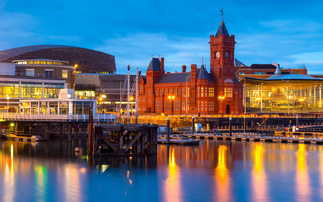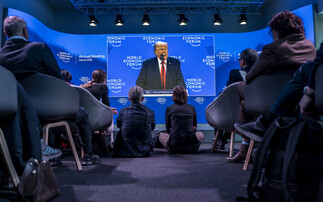
Scottish Exhibition and Conference Centre | Credit: iStock
Business and policy leaders reflect on the major wins from the Glasgow Summit, what needs to happen next, and why COPs could look and feel difficult from now on
The COP26 Climate Summit came to a close a little over a week ago, with nearly 200 counties endorsing the new Glasgow Climate Pact after marathon negotiations that spilled more than 24 hours over schedule.
Some campaigners and commentators swiftly branded the two-week conference as a crushing failure. The cumulative impact of all the newly submitted national climate plans fell far short of meeting the 1.5C goal established by the Paris Agreement, after all, and developed nations failed to meet their $100bn climate target - set in 2009 for 2020 - ahead of the conference. And then, at the summit itself, vulnerable nations' demands for specific 'loss and damage' funding for countries on the frontlines of climate change were flatly rejected, and a historic call for a phase out of coal power in the final agreement was watered down at the last minute after a dramatic intervention from China and India on the conference floor.
But experts speaking in a BusinessGreen briefing last week warned this highly critical assessment of the summit is not only misguided, but could prove counterproductive. While global climate action continued to fall drastically short of levels required to stave of dangerous levels of warming and protect countries that are already being severely impacted by climate disasters, the final agreement in Glasgow should deliver a significant boost to climate action from governments around the world. Crucially, it signalled the fossil fuel economy is coming to a close - albeit a slower one than is needed, with its explicit targeting of fossil fuel subsidies and coal power.
It is a view shared by UN climate change chief Patricia Espinosa, who has said the Glasgow Climate Pact is a "good compromise" and insisted the UK had delivered on its headline promise to "keep 1.5C alive". Meeting the stretch temperature goal of the Paris Agreement may be looking increasingly unlikely, but the Glasgow Climate Pact's request for countries to come back next year with 1.5C-aligned 2030 climate plans opens up a near-term opportunity for leaders to tackle the steep curve of global temperature rise.
Sepi Golzari-Munro, acting director of the Energy and Climate Intelligence Unit (ECIU), warned some media commentators' willingness to condemn the talks as a total failure were part of a worrying trend towards climate fatalism among the public which needed to be addressed. "How we talk about these things is really important, and this applies to businesses as well," she said. "There are so many solutions out there that are being worked on. Not to detract from the problem, or to rest on our laurels, but people find it empowering to hear about the solutions." She highlighted a curious trend where "hard core climate activists" and so-called "climate delayers" were offering the same talking points about the Summit, despite having totally different agendas. The net result was that the accusations that multilateralism has failed to address the climate crisis could prompt climate fatalism to grow, she warned.
Far from proving the UN climate process to be redundant, the Glasgow Summit highlighted the critical importance of convening all nations around the world to discusss climate change, according to E3G CEO Nick Mabey, who pointed out how the Glasgow Climate Pact was a major step up on the weak climate provisions made by G20 nations in a communique just a fortnight before. "The difference between the two outcomes is the difference between a multilateral process and a polluters' process," he said. "That shows that this is the forum that is going to make the weather, and be at the front end of the change, not the other fora."
The COP26 Climate Summit set a number of critical precedents for international climate negotiations, from the inclusion of fossil fuels in the final Pact to a blizzard of side-deals unveiled at the conference that saw governments and big businesses make joint pledges to decarbonise shipping, divest from coal, retire internal combustion engine vehicles, and end deforestation. A small group of countries and states led by Costa Rica and Denmark also pledged to end oil and gas exploration in their own countries, arguing the end of fossil fuel era was nigh. As Frontier Economics' Matthew Bell put it, Glasgow was arguably the first COP conference where the means to decarbonise were discussed alongside the end goals.
Panellists said they expected the strong business presence witnessed at COP to become a feature in the UN climate process moving forward. "Business is cutting through a lot of the politics to get this done because they can't afford stranded assets, they can't afford going down a cul-de-sac of technology if it is not green," said Greg Conary, vice president of government affairs at Schneider Electric. "This has become for the first time almost a business-led initiative."
Crucially, negotiators in Glasgow managed to bring six years of fraught discussions around the Paris Agreement "rulebook" to a close, finalising regulations around carbon markets and regular reporting of climate data by countries. While not perfect - panellists expressed fears that countries and companies that want to 'game' the offsetting market may still be able to do so - some of the more egregious loopholes in the global carbon market have now been closed.
And while progress on climate finance proved disappointing - discussions on loss and damage made very limited progress, as richer nations once again resisted calls to commit to specific humanitarian and development funding package to help countries recover after climate disasters amidst fears they could subsequently get hit with unlimited compensation claims - the new text does commit countries to channel a greater proportion of climate finance towards schemes that help countries protect themselves from the impacts of climate change and commence talks on how climate finance can be boosted further beyond 2025.
The Glasgow Climate Pact also calls for all countries to come back within a year with new climate targets, known as nationally determined contributions (NDCs) in the UN jargon - a breakthrough that allowed the UK Presidency to claim it met its goal to 'keep 1.5C alive', albeit with what COP26 President Alok Sharma described as a "weak pulse".
Pete Betts, the lead negotiator for the EU and UK during the Paris Agreement who is now a fellow at think tank Chatham House, said the conference had exceeded expectations. "The UK team got the top end of doable," he said. "They finalised the rulebook, doubled adaptation finance. There was the strong language on fossil fuels, good language on 1.5C, an annual revisit of ambition."
He conceded the first test of the Paris Agreement's five-year ratchet system delivered "mixed results", noting that bold climate plans from some nations - Nigeria, Vietnam, and India all set new net zero targets - had been overshadowed by continued inaction from the likes of Brazil, Russia, and Australia, as well as China's failure to strengthen its existing net zero by 2060 target. Overall, countries climate plans are still falling far short of keeping temperature rise to 1.5C, but the Paris Agreement's 'ratchet' system does appear to be working broadly as intended, he argued. Climate Action Tracker calculates the cumulative impact of country climate plans submitted before or during the Glasgow conference should put the global economy on track for 2.4C of temperature increases, down from the 3C predicted in Paris in 2015.
Overall, Betts concluded, "it was a good outcome - but of course, we are not remotely on track."
The one-two punch of Betts' appraisal was echoed by many of the other panellists, who similarly said the conference marked a significant acceleration of ambition on previous COPs, but that the pace of climate action continued to be deeply inadequate to the scale of the climate emergency. Ed Rhys Jones, a partner at Boston Consulting Group, the conference's official 'consulting partner', argued that COP26 had "overdelivered given the politics, but underdelivered given the science".
Mabey argued the perception of failure that has attached itself to COP26 in some quarters was driven in part by the ramping up of decarbonisation ambition since the Paris Summit. "If we'd been going for a 'well below 2C' it would have been a great success," he argued. "But of course, the science and the perception of risk has moved, everywhere perhaps instead of China, and so it is well away from 1.5C." But he added that COP26 signalled "the beginning of the end of the fossil fuel era". China remains the last major international coal financier standing, he noted, and public funding flows to all types of fossil fuels is now looking increasingly shaky while at the same time the cost of capital for high carbon projects has increased drastically.
Elisabeth Ottawa,deputy head of public policy at asset management giant Schroders, agreed that the COP26 Summit had sent clear signals to markets globally about the pace and direction of decarbonisation efforts. "We see on a day to day basis that the direction of travel [on climate action] is clear," she said, adding that many of the world's top investors were now committed to responding to these market signals.
Panellists agreed that leaders - and the UK Presidency in particular - were headed for a busy year of diplomacy in the run up to COP27 in Sharm El-Shaikh in Glasgow in autumn 2022. Pressure will be on the UK, which remains COP President until next year's event, to push laggard countries to improve their climate plans within the next 11 and half months in line with the requests made through the Glasgow Climate Pact. Meanwhile, the heat will be on all richer nations to come up with better provisions for loss and damage, an issue likely to be given high billing at an African-hosted summit.
The challenge facing diplomats became clear within hours of the Summit closing, after Australia, New Zealand, and others made clear they had no intention of updating their NDCs before COP27. Meanwhile, President Biden is still struggling to pass his climate-focused infrastructure bill and it remains to be seen how China and India respond to being cast as the blockers of a more ambitious agreement in Glasgow.
However, ECIU acting director Golzari-Munro said there were avenues for the UK Presidency to explore as it seeks to secure strengthened national plans ahead of COP27. The focus over the year ahead should be on translating the pledges already made outside the formal negotiations into national climate plans and unlocking more private finance for the global net zero transition in part by redirecting financing flows from polluting projects into climate mitigation and adapation schemes, she advised. As such, some NDCs could be strengthened without the need for massive internal political battles with Treasury Ministers. Moreover, upcoming elections in Australia and Brazil, and a new government in Germany, could also shift the diplomatic dynamics before governments gather again in Egypt.
Golzari-Munro also counselled the Prime Minister against setting up a net zero ministry headed by Sharma, as reported in The Times last week, arguing the shake-up would trigger an administrative and logistical challenge that would take a significant toll on resources and civil servants. "Government needs to grip this from the top and mainstream it throughout the Cabinet and ministries," she said. "That essentially requires having some heft around the Cabinet table, and really getting the Treasury on side."
For his part, Frontier Economics' Matthew Bell urged governments around the world to now focus on putting mechanisms in place that would enable pledges to turn into actionable policy, from carbon pricing mechanisms to reforms to trade and tax regimes that would pile pressure on laggard countries to embrace the low carbon economy. "Instead of continuing the debates about the scenarios and disasters that might occur if we don't achieve 1.5C or 2C, we need to focus on the steps we need to take," he said.
BusinessGreen's COP26 Business Briefing was held as part of the COP26 Hub, which has been hosted in association with Schneider Electric and BCG.









